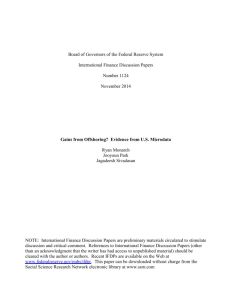
Read or listen offline
Amazon KindleRecommendation
The effects of international trade and globalization on employment, productivity, output and wages in the manufacturing sector have long been fodder for the media, labor unions, government officials and economists. In the United States, growing income inequality is gaining more and more attention, as are the businesses that relocate their operations overseas. Using new analytical tools, economists Ryan Monarch, Jooyoun Park and Jagadeesh Sivadasan offer fresh insights and draw significant conclusions in this scholarly paper about the impacts of offshoring on the US labor force. The report itself, replete with econometric and statistical analyses, may prove a taxing read for the uninitiated, but getAbstract believes that business strategists and policy makers will find its results thought provoking.
Summary
About the Authors
Ryan Monarch is an economist with the Board of Governors of the Federal Reserve System. Jooyoun Park is an assistant professor of economics at Kent State University. Jagadeesh Sivadasan is an associate professor of business economics at the University of Michigan.


















Comment on this summary